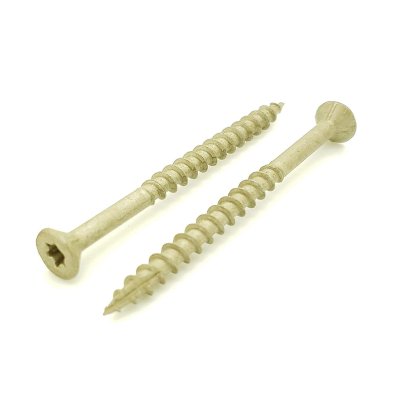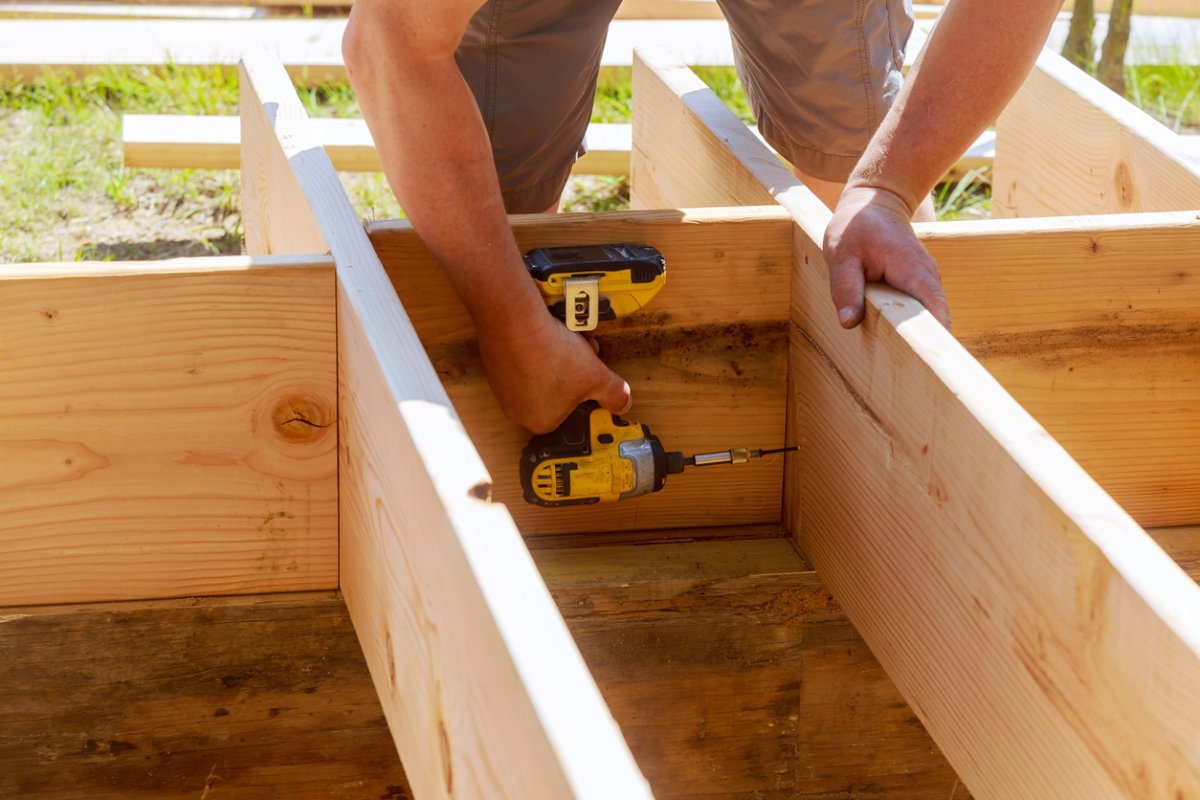
We may earn revenue from the products available on this page and participate in affiliate programs. Learn More ›
Deck screws secure decking boards that make up the walking surface of a deck, porch, dock, or boardwalk. If you are constructing a new deck or repairing an old one, selecting the best performing deck screws is important.
Before beginning a project, consider your decking materials and climate. Non-treated wood requires different screws than common treated options like pressure-treated lumber. Coastal areas, salt exposure, and chloride could also cause decay over time, so the right screw type prevents unwanted damage.
Keep reading to find out more about the best deck screws needed for your outdoor project.
- BEST OVERALL: SNUG Fasteners Tan Fence & Deck Screws | Star Drive
- BEST BUDGET: Hillman Fasteners 48419 Deck Screws
- PRESSURE TREATED WOOD PICK: Power Pro 48611 Premium Exterior Wood Screws
- BEST FOR COMPOSITE: Jake Sales Composite Decking Wood Screw
- BEST FOR DECK FRAMING: GRK RSS-185 Structural Screws
- BEST FOR JOIST BEARINGS: Deck Plus 48415 Wood Screws
- BEST FOR RAILINGS: FastenMaster FMTLOK06-50 TimberLOK
- ALSO CONSIDER: Eagle Claw 304 Stainless Steel Deck Screws
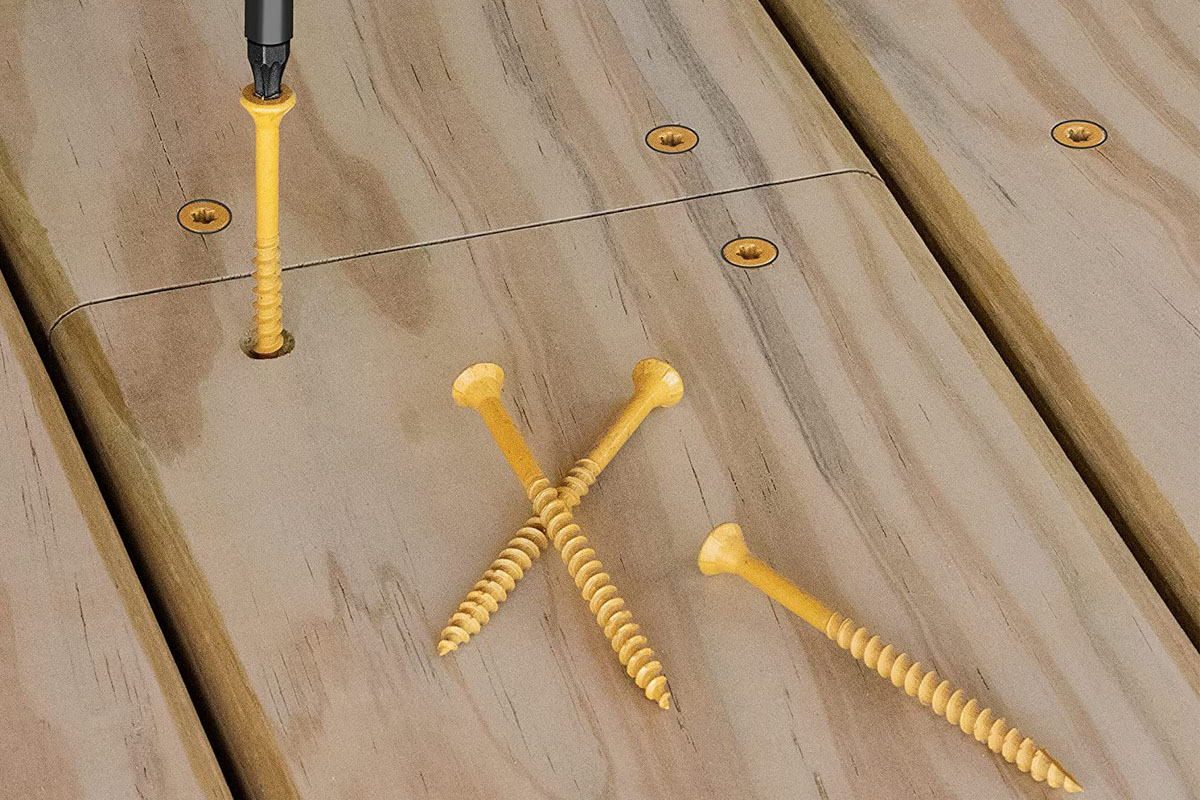
What to Consider When Choosing the Best Deck Screws
While the deck board, posts, and railings are responsible for supporting people and items on the deck, the deck screws and fasteners hold the entire structure in place. It’s important to take some time to consider the features and factors of deck screws, and how they affect the quality, durability, and suitability of the product.
Material and Coating
When searching for appropriate screws to secure the deck, it’s necessary to note the material from which the screw is made and if there is a protective coating.
- Stainless steel fasteners are great for light deck boards because they naturally resist water and rust, so there is typically no need for a protective coating that may stain the wood.
- Alloy steel and carbon steel are also suitable options that can come with a weatherproof coating to keep the screws safe during long winter seasons and humid summers. The weatherproof coating is especially important for lakefront or seaside properties that have a high level of moisture in the air throughout the entire year.
Head Style
Deck screws typically have flat heads, but there are actually several other types of screw heads that you can consider before settling on the best format for your deck. These include flathead, trim head, truss head, hex head, and round head screws.
- Flathead screws have a completely flat screw head. These are a great option for building a deck because the flat head can lay flush with the surface of the wood or composite material, instead of sticking up from the surface.
- Trim head screws are essentially flathead screws with much smaller heads. The head is completely flat and it has a smaller diameter, making these fasteners a good choice for decking.
- Truss head screws have an extra-wide screw head with a slightly rounded surface or top that protrudes just above the surface where it is fastened.
- Hex head screws are equipped with a hexagonal-shaped head that is made to be tightened with a wrench or socket.
- Round head screws have a flat screw head bottom and a rounded screw head top that sticks up from the surface where the screws are secured. They aren’t recommended for decks because the protruding screw heads can be a nuisance when people are walking.
Drive Type
The drive type refers to the type of recess on the screw head and the type of screwdriver that will drive it in. Choose an appropriate drive type for your project and preferences.
Although a Torx drive is typically the best option for getting jobs done quickly and effectively, you might work better with a Robertson drive. Take a look at some of the options and choose the drive that you prefer.
- Phillips-head screws have a cross-shaped recess and they are one of the most popular drive types, though they don’t have the same driving power or torque as a Robertson or Torx screw.
- Slotted screw heads simply have a slot running through the center of the head. These screws are great for softwood, but the slotted screwdriver or drill bit can easily slide from the screw’s slotted recess, slowing down the project.
- Combo screw heads combine more than one drive type. For example, a screw head could have both a Phillips and slotted drive, giving users more than one option to work with.
- Hex screw heads have a hexagonal recess that provides a significant amount of friction to help the screwdriver or drill bit grip the screw without slipping.
- Robertson screw heads may be better known as square screw heads. These screws are a common option for decking because they are easy to find and they have a higher driving power and torque than other popular drive types, like Phillips-head screws.
- Torx screw heads are the best option for quick, effective deck installation. This is because the star-shaped recess has 12 sides that the Torx screwdriver can grip, increasing the friction and grip strength between the screw and the driver. It is easy to apply a high level of torque and driving power without the Torx screwdriver or bit slipping from the Torx drive.
Thread
The correct thread on a screw can help to speed up the project, while the wrong thread can put a full stop on building or repairing the deck. Check the product description for the threads-per-inch measurement, which is typically indicated in the name or manufacturer’s information.
Any products that are marketed as deck screws usually have normal or coarse threads. While some wood may work well with fine threads and a high thread count, this isn’t usually the case for pressure-treated deck boards because the density of the wood fibers makes it difficult to drive the narrowly spaced threads through the wood.
Length
The standard length for deck screws ranges from 1 ½ inches to 6 inches, depending on the size of the deck boards, joists, railings, and posts. Ideally, the screw should penetrate completely through one piece of wood or composite and about half of this length into the second piece of wood or composite to properly secure the two pieces together.
For example, a 6-inch screw would penetrate through a 4×4 post and drive another 2 inches into the frame or joist of the deck. 1 ½-inch and 2-inch deck screws are good for securing the ledger board or joist hangers because they won’t protrude out from the other side of the wood at this short length.
Deck screws measuring 2 ½ inches and 3 inches usually work best for fastening railings, deck boards, and joists, while 6-inch deck screws are necessary for 4×4 posts.
Intended Use
Choosing the right deck screws means determining the size and type of decking materials, as well as where the deck screws will be used in the project. Here are a few specialized products and the situations in which they work best.
- Structural screws are thicker because they are made for the purpose of fastening load-bearing sections together. This makes them great for attaching joists to ledger boards and securing railing posts.
- Non-coated stainless steel screws are a good choice for light-colored wood because they don’t have a coating that could stain the wood after exposure to rain, sleet, or snow.
- Trim head screws are better for composite decking due to the small head and typically tighter threads that help to reduce composite tear-out problems.
- Lag bolts or lag screws are primarily used for securing posts or ledger boards. The head can be driven into the lumber to produce a flush feeling and appearance. Flathead screws are also suitable for this purpose.
Our Top Picks
From building a backyard deck to repairing a dock, the deck screws chosen make a difference. Find the best deck screws for the job with these top performers across categories.
Best Overall
SNUG Fasteners Tan Fence & Deck Screws | Star Drive
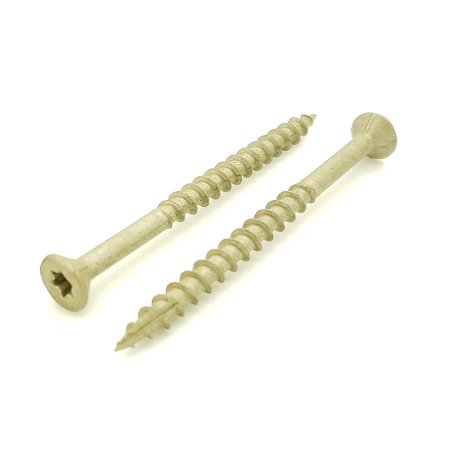
Pros
Cons
Product Specs
- Material: Stainless steel
- Drive Type: Torx
- Length: 2 ½ inches
If users need an adaptable deck screw that handles a range of challenges, they may want to consider SNUG Fasteners deck and fence screws. These premium corrosion-resistant deck screws feature a tough ultra-guard coating for use in pressure-treated lumber and a star drive for fast, easy installation.
On the bugle-shaped head of the screws, nibs allow for better concealment after installation. A Torx star-drive bit is included in the package, along with 100 #9 2½-inch screws. These screws are suitable for decking materials less than 1½-inch thick.
Best Budget
Hillman Fasteners 48419 Deck Screws
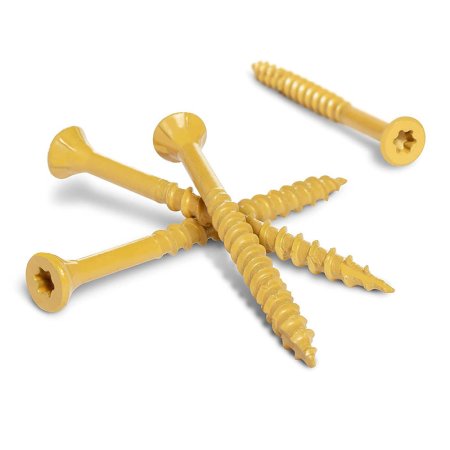
Pros
Cons
Product Specs
- Material: Alloy steel
- Drive Type: Torx
- Length: 3 inches
For a plentiful supply of deck screws with deep attachment strength at a value price, Hillman Fasteners deck screws could be just the thing. These coated deck screws are recommended for pressure-treated lumber. They feature a self-drilling cut point, a coarse, serrated thread for a stronger hold, and a flat head with countersinking nibs for a clean, even finish.
Also called Torx drive, the star-drive head helps transfer torque to prevent cam-outs, which occurs when the driver slips out of the screw’s head. This is a 5-pound package of #10 3-inch deck screws.
Pressure Treated Wood Pick
Power Pro 48611 Premium Exterior Wood Screws
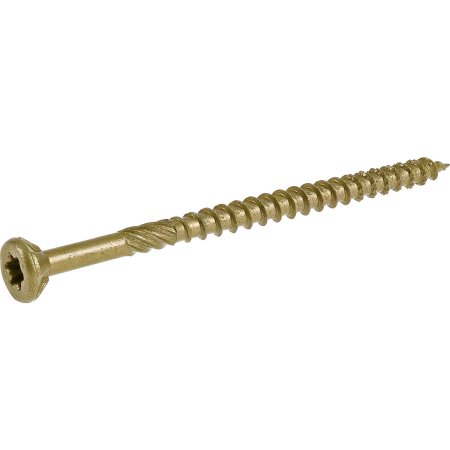
Pros
Cons
Product Specs
- Material: Alloy steel
- Drive Type: Torx
- Length: 3 inches
For a deck screw that will help you work faster and provide cleaner results in pressure-treated lumber, check out these Power Pro screws. They have a bronze polymer coating that protects the screw from corrosion caused by the wood preservatives.
The unique thread design drives up to 20 percent faster without predrilling, and the no-split twist shank eliminates splitting and cracking. Countersinking blades enable a more secure connection into the wood surface. The star drive eliminates cam-out for a smoother drive. This pack includes 450 #9 3-inch deck screws.
Best For Composite
Jake Sales Composite Decking Wood Screw
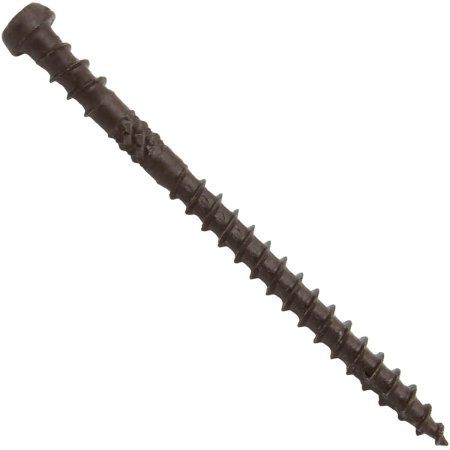
Pros
Cons
Product Specs
- Material: Alloy steel
- Drive Type: Torx
- Length: 2 ¾ inches
If you are working with composite decking, opt for these specialized screws. The self-countersinking design and extra sharp point reduce the need for predrilling, even in hardwoods. The star drive withstands up to twice the torque that Phillips or square-drive screws handle.
The threads on these screws are deep, wide, and sharp, and are compatible with treated lumber deck framing. These 2 ¾inch deck screws have a corrosion-resistant finish available in various colors to match your decking material or stain.
Best for Deck Framing
GRK RSS-185 Structural Screws
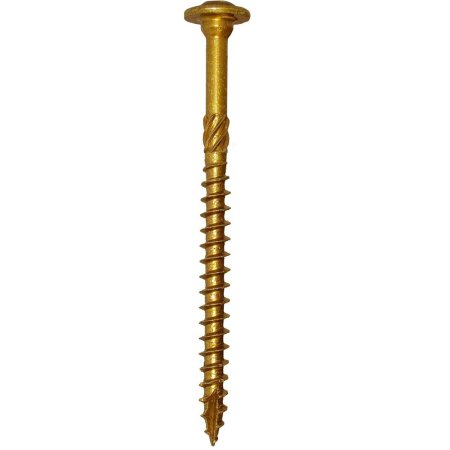
Pros
Cons
Product Specs
- Material: Alloy steel
- Drive Type: Torx
- Length: 3 ⅛ inches
The screws normally used for decking are not made to handle the working loads of framing. Although many deck framers use galvanized nails, these screws are another useful option. They are made of specially hardened steel for high tensile, torque, and shear strength.
The screws have sharp threads and points that quickly bite into frame material to reduce splitting. Six CEE threads along the mid shank enlarge the screw hole for the non-threaded upper shank, allowing the wood to settle and increasing the screw’s drawing strength.
The round head with a built-in washer plus the added shoulder beneath has no sharp edges. This helps center the screw into predrilled connector plates. The package contains 50 #10 3 ⅛-inch structural screws.
Best for Joist Bearings
Deck Plus 48415 Wood Screws
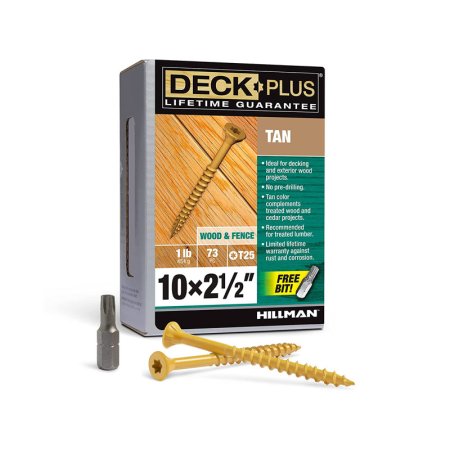
Pros
Cons
Product Specs
- Material: Alloy steel
- Drive Type: Torx
- Length: 2 ½ inches
Take on the next deck building or repair project with this pack of deck screws by Deck Plus. The product includes a Torx-drive bit and 73 #10 2 ½-inch screws. The length of the screws and the 4-layer protective coating combine for ideal securing of joists, joist bearings, and joist hangers on outdoor building projects.
The epoxy coating is highly effective at safeguarding against chemical corrosion, rain, wood sap, snow, UV radiation, and temperature fluctuation to extend the life of the screws and the deck. The flathead design allows the screws to sit flush with the deck, while the self-tapping tip and threads easily cut through wood. The thick protective coating can slow the driving speed of the screws in some cases.
Best for Railings
FastenMaster FMTLOK06-50 TimberLOK
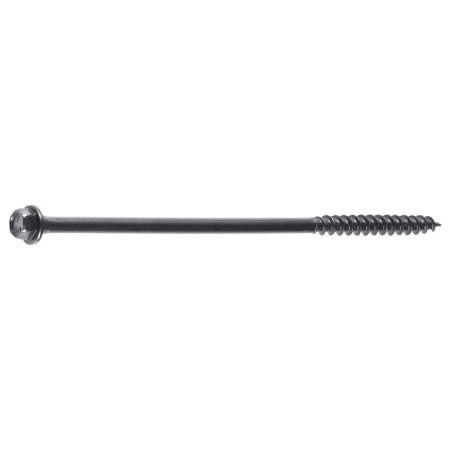
Pros
Cons
Product Specs
- Material: Carbon steel
- Drive Type: Exterior hex
- Length: 6 inches
Finding the right deck screw to properly connect a support post to the framework of the deck means looking for a product that is both long enough and strong enough to handle the necessary tensile, torque, and shear loads. This package of 50 lag bolts is a great option for both railing and posts with a length of 6 inches.
The deck screws have an external hex drive system for easy driving of the screws the full 6 inches deep, burying the head in the material for a flush appearance. These bolts even come with a hex bit, so users don’t need to search for a bit that fits the head before starting the project.
The carbon steel lag bolts have a weather-resistant coating and a tapered head that is designed to countersink into the wood. However, due to the length and thin diameter of these screws, they are vulnerable to bending and breaking if they are driven with too much force.
Also Consider
Eagle Claw 304 Stainless Steel Deck Screws
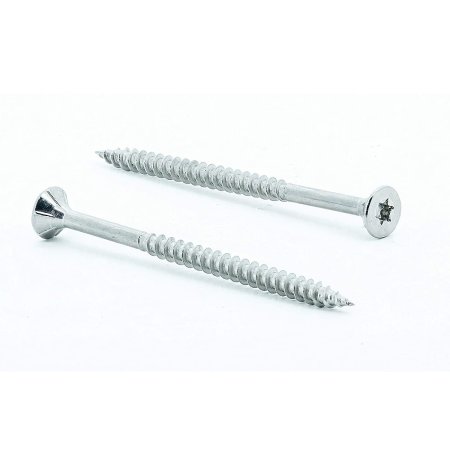
Pros
Cons
Product Specs
- Material: Stainless steel
- Drive Type: Torx
- Length: 3 inches
For decking material that is not pressure-treated, consider Eagle Claw deck screws. This stainless steel formulation provides plenty of weather resistance in most environments at a lower price than comparable 316 stainless steel screws. They also won’t stain non-treated wood, like galvanized screws.
These deck screws are suitable for hardwood and softwood, including redwood and cedar. They feature a star-drive head, and nibs under the head to help seat the screw. Pilot holes are recommended as these are not self-drilling screws. The package contains 5 pounds of #10 3-inch 304 stainless steel screws.
Our Verdict
For quality, efficacy, and a highly effective Torx drive system, it’s tough to beat the SNUG Fasteners deck screws when securing joists, deck boards, and railings. As an affordable alternative, the Hillman Fasteners set contains over 300 screws in one package to help keep costs low on large deck-building projects.
How We Chose the Best Deck Screws
Deck screws aren’t luxury items that come with a wide variety of features, so the decision-making process was relatively straightforward with a significant emphasis on the quality, size, design, and suitability for use on specific parts of the deck.
After extensive product research, the deck screws listed above were selected by considering the material, drive type, and coating. The top picks represent deck screws in a range of sizes for securing joists, railings, deck boards, and even large, 4×4 posts—so readers can find the right screws for each part of the deck building or repair process.
FAQs
Secure pressure-treated wood and composite deck boards with the appropriate screws to preserve your deck for years to come.
If you still aren’t sure about the best deck screws for your project, consider reading the answers to some of the most commonly asked questions below for a little help in selecting and using the best product.
Q: Are deck screws the same as wood screws?
Deck screws are a type of wood screw, however, not every wood screw is suitable for use in decking projects. This specialized type of screw typically has a waterproof coating that can secure a deck board through rain, sleet, and snow without rusting.
Q: What screws should I use for decking?
Deck boards are typically secured with 2 ½-inch to 3-inch deck screws. However, hidden fastening systems, like lag screws, can be a good option for railings and posts.
Q: Are deck screws OK for framing?
Nails are commonly used for framing because they have a high level of shear strength. While deck screws are very resistant to pull-out forces, which is ideal as deck fasteners for securing posts, deck boards, and joist hangers, they are weak in shear strength, so deck screws should not be used for framing.
Q: How long should decking screws be?
Deck screws are usually about 3 inches, though it may be a good idea to use 6-inch screws if you need to secure a 4×4 post.
Mark Wolfe is a freelance writer who specializes in garden, landscaping and DIY content. After working twenty years in the nursery and landscape industry, Mark worked for several online media outlets and retailers, including HGTV, WORX Tools, and Dave’s Garden. He holds a degree in Outdoor Education from Northland College. When not working, Mark enjoys gardening, beekeeping, traveling and exploring nature with his family in Georgia.
